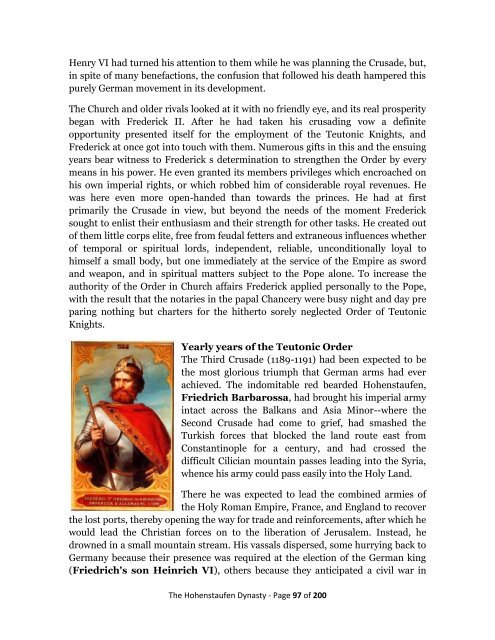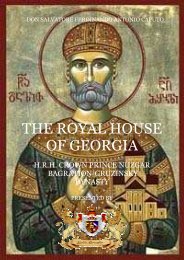here - Nobility Associations
here - Nobility Associations
here - Nobility Associations
You also want an ePaper? Increase the reach of your titles
YUMPU automatically turns print PDFs into web optimized ePapers that Google loves.
Henry VI had turned his attention to them while he was planning the Crusade, but,<br />
in spite of many benefactions, the confusion that followed his death hampered this<br />
purely German movement in its development.<br />
The Church and older rivals looked at it with no friendly eye, and its real prosperity<br />
began with Frederick II. After he had taken his crusading vow a definite<br />
opportunity presented itself for the employment of the Teutonic Knights, and<br />
Frederick at once got into touch with them. Numerous gifts in this and the ensuing<br />
years bear witness to Frederick s determination to strengthen the Order by every<br />
means in his power. He even granted its members privileges which encroached on<br />
his own imperial rights, or which robbed him of considerable royal revenues. He<br />
was <strong>here</strong> even more open-handed than towards the princes. He had at first<br />
primarily the Crusade in view, but beyond the needs of the moment Frederick<br />
sought to enlist their enthusiasm and their strength for other tasks. He created out<br />
of them little corps elite, free from feudal fetters and extraneous influences whether<br />
of temporal or spiritual lords, independent, reliable, unconditionally loyal to<br />
himself a small body, but one immediately at the service of the Empire as sword<br />
and weapon, and in spiritual matters subject to the Pope alone. To increase the<br />
authority of the Order in Church affairs Frederick applied personally to the Pope,<br />
with the result that the notaries in the papal Chancery were busy night and day pre<br />
paring nothing but charters for the hitherto sorely neglected Order of Teutonic<br />
Knights.<br />
Yearly years of the Teutonic Order<br />
The Third Crusade (1189-1191) had been expected to be<br />
the most glorious triumph that German arms had ever<br />
achieved. The indomitable red bearded Hohenstaufen,<br />
Friedrich Barbarossa, had brought his imperial army<br />
intact across the Balkans and Asia Minor--w<strong>here</strong> the<br />
Second Crusade had come to grief, had smashed the<br />
Turkish forces that blocked the land route east from<br />
Constantinople for a century, and had crossed the<br />
difficult Cilician mountain passes leading into the Syria,<br />
whence his army could pass easily into the Holy Land.<br />
T<strong>here</strong> he was expected to lead the combined armies of<br />
the Holy Roman Empire, France, and England to recover<br />
the lost ports, t<strong>here</strong>by opening the way for trade and reinforcements, after which he<br />
would lead the Christian forces on to the liberation of Jerusalem. Instead, he<br />
drowned in a small mountain stream. His vassals dispersed, some hurrying back to<br />
Germany because their presence was required at the election of the German king<br />
(Friedrich's son Heinrich VI), others because they anticipated a civil war in<br />
The Hohenstaufen Dynasty - Page 97 of 200



